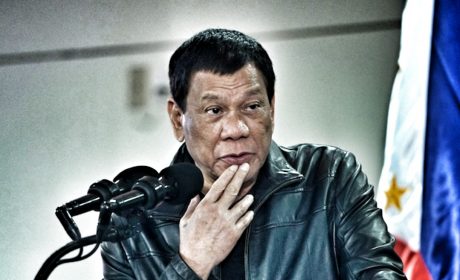
Of late, Philippine President Rodrigo Duterte is the subject of a complaint filed before the ICC accusing him of “crimes against humanity” and Opposition has been exchanging mutual high-fives over news that the ICC has initiated “preliminary investigations” on the matter. Are the agents of the much-feared “International Criminal Court” (ICC) about to parachute into Manila and get to the bottom of the so-called “war on drugs” (a.k.a. the “war on the poor” according to the Philippine opposition)? Highly doubtful.
For one thing, there is no evidence that the Philippines’ judicial system has ceased to function. The fact that the Opposition (led by Liberal Party cohorts, a.k.a. the Yellowtards) are noisily supporting current Chief Justice Maria Lourdes Sereno who is currently battling allegations of improper conduct on many fronts, is proof that the Opposition tacitly acknowledge that the justice system is still working.
The process the ICC will go through to assess whether or not the case is worthy to go to trial is a long one and involves determining whether (1) any crimes were actually committed (something even the Philippine Opposition struggles to prove), and (2) whether the party state failed to prosecute the crime where complaints had been filed.
As far as can be observed, neither of the above two criteria had been met by anyone accusinng Duterte of “crimes” of any sort. The only thing at work, as usal, is a global trial by media. The Yellowtards have had ample experience in the practice of using corporate media organisations to demonise their enemies as was observed during the “impeachment trial” of the late former Chief Justice Renato Corona in 2012, and going back even further.
In this current instance, the allegations against Duterte rest almost entirely on the back of what has since been revealed to be incorrect information about the extent of so-called “extrajudicial killings” being propagated by “social news network” Rappler. Columnist Rigoberto Tiglao revealed in an article published on the Manila Times how Rappler had sloppily cobbled together disparate snippets of data to come up with an inflated “death toll” figure that it then proceeded bandy around (and, as a result, lapped up and regurgitated by Western news media companies). Throughout this, Tiglao points out how the editorial leadership of Rappler had remained tight-lipped in response to requests for them to clarify the anomalies in their reporting…
I had emailed Rappler managing editor Glenda Gloria and the researcher who wrote the piece, Michael Bueza, two weeks before I wrote my exposes on their epic lie, requesting if they could clarify to me how they got the 7,080 figure. They didn’t respond at all, not even a “no-comment” or mind-your-own-business reply.
Not surprising then that a management team that had become renowned for routine lack of transparency in how they go about their business is now in trouble with the Philippines’ Securities and Exchange Commission (SEC) for failing to comply with regulations that restrict sourcing of funds in exchange for the slightest semblance of control from foreign entities. It is no wonder that mainstream news media had lost the trust of the public considering that a dishonest organisation such as Rappler had, in the last several years, so presumptuously positioned itself as God’s Gift to Philippine Journalism.
The fact is, there is no breakdown of institutional democracy in the Philippines and all duly-constituted administrative processes are channeling political power through lawful channels. This is, in fact, so unlike the preferred extraconstitutional modus operandi that has come to characterise how Yellowtards go about their business of shouting down people in government that they do not like.
If the Opposition are so convinced that it will take the intervention of a foreign entity like the ICC to sort out their country’s internal affairs, then they should act consistently with that stance and refuse to participate in any further exercise that involves institutions and democratic processes that they believe have “broken down”. Indeed, that is exactly the thinking that goes into their preferred trademark modus operandi — those so-called “people power revolutions”. In that sense, the call for ICC intervention is no different in principle to the Yellowtard “people power revolution” exercise. By inviting the ICC to do the job of the Philippine judiciary, the Yellowtards have, in principle, issued a no-confidence vote on Philippine democracy. They should not be allowed to have their cake and eat it.

No comments:
Post a Comment